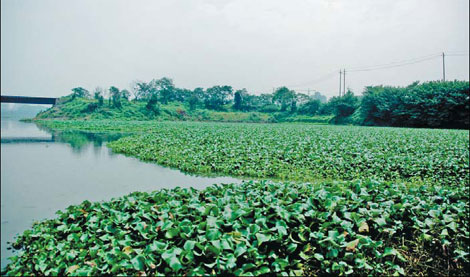Other voices: When cures can kill
Updated: 2012-02-19 08:33
By Pauline D. Loh(China Daily)
|
|||||||
|
Water hyacinth can act as a natural filter, but must be harvested regularly and watched so they do not go feral. Provided to China Daily |
When it comes to an environmental issue like Dianchi Lake, it is not hard to find passion, and nowhere does it flame higher than in the hearts of the people of Yunnan and those who have chosen to make their homes in this beautiful province in Southwest China.
Liu Su is the Greater China manager of Civic Exchange, a powerful policy think tank based in Hong Kong that focuses on mainly environmental issues. Liu is from Yunnan and she has followed the Dianchi issue closely, both with intense professional and personal interest.
While she recognizes that much effort and money have been invested into the restoration of the lake, she feels strongly that much more needs to be done, especially in the management of these "cures". Otherwise, Liu says, the cures may kill.
"We need to acknowledge that, from the central government to the local authorities, there has been tremendous effort thrown into the Dianchi resurrection, both financially and administratively.
"It has achieved some results, but can we say that Dianchi has been revived? I think it is still premature to say that."
Liu quotes experts who worry about the carbon accumulation in the lake, one of the major factors that may turn it into a dead sea.
She notes that so far, all the suggested methods used to treat the lake's problems also release soluble carbon into the water, which will accumulate. This, on top of the climate changes already affecting Yunnan, may sound the death knell.
While it is easy to initiate methods that are potentially good, Liu says, the lack of a systematic approach may kill the cure. What is needed, she stresses, is to ensure that every project proposed to clean up the lake must go through the process of "scientific assessment to scientific implementation and sustainable management".
"Like the recent water hyacinth project, which did not go through environmental assessment before the implementation. Nor was there a disaster control contingency plan when the situation started to go off track.
"Up to now, whether the project is well under control is still very questionable. The result of non-controlled water hyacinth growth in Dianchi could ruin years of effort in a matter of months," Liu says.
Another point of contention is the accountability of the huge amounts of money that had been, almost literally, thrown into the lake.
Liu feels there must be total transparency so that it can be tied to personal accountability.
In this, she credits Yunnan province deputy party secretary Qiu He for his "river chief" system, in which he appoints an official to be in charge of each section of the water system and makes the appointee personally responsible for achieving the environmental targets.
But, Liu is skeptical about the water diversion project from the Niulan River. Her rationale is simple. On Feb 16, a local paper reported that the river was drying up, due to the continuing drought in Yunnan.
"It is a hasty decision without proper environmental and social impact assessment," Liu declares, noting that if you do not respect nature, nature will punish. The hope that the Niulan River may save Dianchi may end up wishful thinking, she says, and the project may well ruin the ecological balance of the river without necessarily helping Dianchi.
Another voice raised against patchwork solutions is Professor Hou Mingming from the Institute of Environment Engineering, Kunming Technological University.
In a letter to Qui He, who is known as an ardent environmental crusader, Hou argued against the proposal to plant 700,000 China firs (Cunninghamia lanceolata) along the edges of the lake.
Hou says the evergreens will ruin the ecological balance of the painstakingly nurtured wetlands and disrupt their self-cleaning ability. The trees will hasten natural reclamation, which will negate the functions of the wetlands.
In his letter, the professor cited two such "remedies" that should be learned from.
In the 1950s, millions of hectares of wetland were planted with trees in the "vast wilderness of the north" in Heilongjiang province. In 2001, large numbers of willows were planted along the edges of the Sword Lake in Yunnan's Jianchuan county.
In both cases, the eco-system changed and the topography was altered for the worse.
In addition, Hou pleaded against the planting of the evergreens by pointing out that pine needles from the evergreens would add to the problems of pollution in the lake. Pine needles do not easily decompose.
Liu summed up by pointing out three urgent needs:
All water hyacinth planted in the lake should be harvested and properly disposed of to prevent secondary pollution.
Management of the wetlands re-created around the lake needs to be closely monitored. Otherwise, the wetlands may actually worsen eutrophication of the water instead.
Control and limits on lakeside real estate projects that may affect the water system and damage the microcirculation of the lake. Dense habitats will have increased sewage.
You may contact the writer at paulined@chinadaily.com.cn.
China Daily
(China Daily 02/19/2012 page3)
